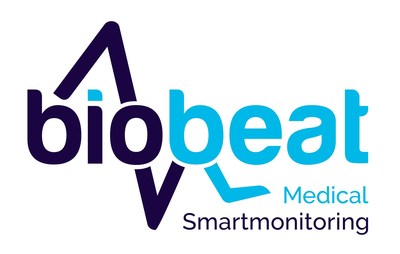Biobeat, a global leader in wearable remote patient monitoring solutions for the healthcare continuum, announced today the results of a comparison study of blood pressure measurements using its proprietary wearable photoplethysmography-based (PPG) device and a standard cuff-based manometry device.
|
PETAH TIKVA, Israel, Oct. 5, 2020 /PRNewswire/ -- Biobeat, a global leader in wearable remote patient monitoring solutions for the healthcare continuum, announced today the results of a comparison study of blood pressure measurements using its proprietary wearable photoplethysmography-based (PPG) device and a standard cuff-based manometry device.  The clinical study, Comparing Blood Pressure Measurements Between a Photoplethysmography-Based and a Standard Cuff-Based Manometry Device, published in Scientific Reports, compared the similarity of measurements and overall agreement of blood pressure measurements between Biobeat's novel cuffless device and a standard sphygmomanometer cuff-based device. Measurements were taken from 1,057 test subjects, with 491 test subjects receiving a second measurement after a short period of activity (5 minutes of strenuous walking). Test subjects averaged 66 years of age, had an average BMI of normal-high (mildly overweight), and 9.1% of subjects were previously diagnosed with hypertension. "Patients with hypertension require a holistic approach to care, necessitating frequent home-based and ambulatory blood pressure monitoring to provide consistent and accurate patient readings," said Prof. Arik Eisenkraft, CMO of Biobeat. "The findings from this study demonstrate the accuracy and reliability of Biobeat's PPG-based device for home and ambulatory measurements. Additionally, the cuffless PPG-based monitor is a viable option for out-of-office blood pressure monitoring, even in challenging clinical settings, allowing for replacement of cumbersome cuff-based automatic blood pressure monitoring devices." Study results showed that the mean value of the differences in systolic and diastolic measurements for all subjects was less than 5.0 mmHg and the SD was less than 8.0 mmHg, as required by different regulatory protocols such as the ISO 81060-2:2013. This indicates that Biobeat's novel PPG-based device can accurately and reliably detect and follow changes in blood pressure over time for patients with both normal and high blood pressure, and not only when the blood pressure is stable. "All patients, especially those with hypertension, require blood pressure monitoring so that health practitioners can adjust treatment and ensure optimal care," said Arik Ben Ishay, CEO of Biobeat. "This study proves the efficacy of our PPG-based device, which is also simpler to place and use than traditional cuff-based devices. As a wearable device, the design also improves patient compliance without disrupting daily routines. These findings represent an evolution within the healthcare continuum, sparking a change in the way blood pressure will be monitored in the near future, in pre-hospital and in-hospital settings, as well as long-term home care scenarios." About Biobeat Biobeat is a med-tech company with unique health-AI abilities in the patient monitoring space. The company's remote patient monitoring (RPM) health-AI platform includes a disposable short-term chest-monitor and a long-term wrist-monitor, both of which utilize a photoplethysmography-based (PPG) sensor to continuously provide accurate patient readings of 15 health parameters, including cuffless blood pressure, pulse rate, respiratory rate, blood oxygen saturation, temperature, stroke volume, cardiac output, one lead ECG (only chest-monitor) and more. Leveraging its automatic, continuous and noninvasive RPM AI platform, Biobeat has generated the biggest vital-sign database in the world, which it utilizes to identify early deterioration of patients via its proprietary big-data and health-AI tools. Aggregated patient health data is viewed by medical staff via Biobeat's secure HIPPA and GDPR compliant cloud-based patient management platform, which utilizes an automated real-time early warning score (EWS) system that incorporates advanced AI-based algorithms to provide alerts on patient health status and potential deterioration. These capabilities allow Biobeat to support medical teams with tailored patient care such as adjustment of therapeutics and early prevention of specific disease exacerbations. Biobeat's wearable devices are the first devices to be FDA-Cleared for cuffless non-invasive blood pressure monitoring and are also CE Mark certified. Founded in 2016, Biobeat is headquartered in Petah Tikva, Israel. For more information, visit: https://www.bio-beat.com/. Follow Biobeat on LinkedIn. Media Contact: Company Contact: SOURCE Biobeat |




